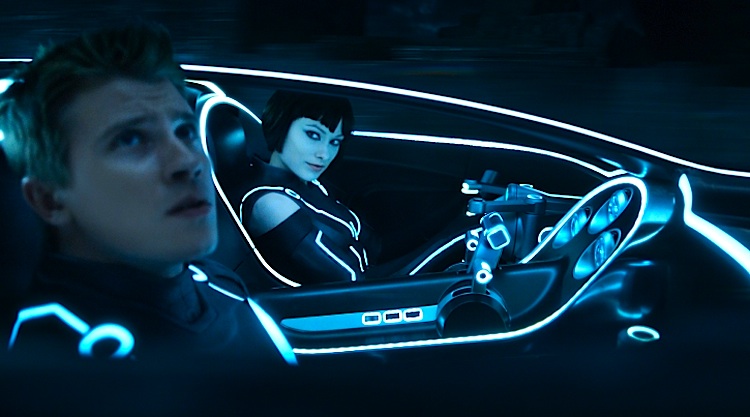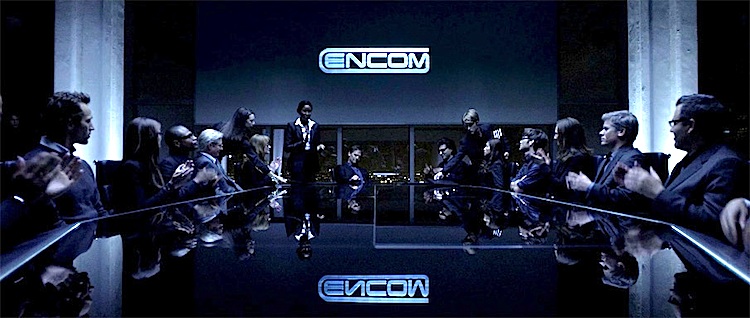
By David Ross. I finally saw the vacuous Tron: Legacy (see here for Libertas’ original review). My motive was less science fiction completism than the desire to take a long gander at Olivia Wilde, whom I last saw kissing Mischa Barton in The O.C., but the movie managed to frustrate even this simple desire. La Wilde does not appear until the movie is half over, and then in a boyish bob and inexplicably unflattering rubber cat-suit. In the end, I had to make due with a mere glimpse of shoulder: thin compensation for two hours of Tron’s mumbo jumbo.
The movie denounces joyless soulless totalitarian mechanism, but who favors joyless soulless totalitarian mechanism? This is about as interesting as coming out against puppy torture or tulip decapitation. What two-year-old wouldn’t understand that sunless realms devoted to murderous bloodsport are somehow bad? Serious dystopian works are about the nuanced psychology of totalitarianism (v. The Lives of Others). Only Hollywood pats itself on the back merely for recognizing that totalitarian systems are – to choose an IQ-appropriate word – yucky.
All of this is water under the bridge of another exercise in Hollywood banality. What I really want to mention is the delicious Disney hypocrisy with which the film opens. Grid inventor Kevin Flynn (Jeff Bridges) tells his son as he goes through the good-guy routine of tucking him into bed: “Clu, Tron, and I built a system where all information was free and open. [Nostalgic sigh]. Beautiful.”

We then proceed by route of cliché to the dark, metallic boardroom where the evil corporation Encom is counting its money. Bruce Boxleitner, an old Flynn protégé, asks: “Given the prices that we charge to students and schools, what sort of improvements have been made in Encom OS-12?” The mustache-twirling CEO says: “This year we put a 12 on the box.” A techie-genius-for-hire chimes in: “OS-12 is the most secure operating system ever released. The idea of sharing our software or giving it away for free disappeared with Kevin Flynn.”
This is too rich coming from the company that rammed through the so-called “Mickey Mouse Protection Act“; that sued L.A. produce vendors for selling piñatas featuring unlicensed Disney characters; that sued a pair of clowns for sporting Disney-themed costumes. I recall a funny episode of The Simpsons in which – parody verging on reality – the mere mention of Disney brings two lawyers immediately to the door with a cease-and-desist order.
And the chutzpah of the allusion to “improvements”! Disney has never met a peacefully interred classic that it was not ready to disinter and pimp out. Exhibits A and B: Cinderella II: Dreams Come True and Cinderella III: A Twist in Time. This is worse than merely repackaging the same old product (which by the way Disney does all the time in the form of “Platinum Editions”); this is willfully disfiguring mythic pattern, confusing something that was unconfused.
Posted on April 25th, 2011 at 8:26am.
Disney corp hypocrisy exhibit # 2: WALL-E. An Eco fable about the earth choked to death in consumerist trash, brought to you by a company whose bottom line is largely based on the production of consumerist trash.
My question is, does this make Disney any more hypocritical than the rest of Hollywood these days? E.G. Capitalist billionaire James Cameron lecturing us on the evils of capitalism.
I would say … no.
K:
I saw WALL-E a little differently. To me, it was anti-nanny state — it reminded me of Ayn Rand’s Anthem more than anything.
I also see a huge difference between consumerism and capitalism. Unfortunately we are a nation that simply consumes, and does not produce enough.
With all due respect, you are looking past the very obvious and focusing on the subtle. If the theme is anti-nanny state, it is a very well disguised theme.
“Consumerism” is a boogie man created by those who think people spend too much money on the frivolous. Money that could more constructively be taken by the state and spent on the heads of corrupt African states in the form of “aid” or making sure the party in power stays the party in power. This beneficent Platonic state is exactly what the dystopian world of WALL-E lacks.
The best way to “watch” this movie is not to. But buy the soundtrack instead for Daft Punk. It’s a watered down Daft Punk but it’s still Daft Punk
Hey, I have a question on that subject. I bought the Tron-Daft Punk soundtrack and love it, but the CD is black and my players don’t consistently play it. Do you have that problem?
No I downloaded it off of Amazon. You could have a pirate copy?
No, I bought it at F.Y.E. The problem is that it’s a jet-black disk, and the lasers on the CD players don’t read it well. I’m amazed Disney put it out like this.
Disney wants your money over and over and over and over again!
Good article.
I can’t really disagree with it — or Jason’s review — but I still enjoyed both Tron films. It’s true … we can’t grade it on a curve just because it shows a totalitarian baddie, but I’ll take it — certainly beats the heck out of having a Catholic Priest of a PTSD-stricken soldier as the villain.
Tron films are like a candy bar to me: There’s no nutritional value, but they’re good while they last … and too much is bad for you. That’s why we have films like The Lives of Others … brilliant comparison, by the way.
I’d like to add here that I did ultimately buy a copy of both Tron: Legacy and the original Tron. Both films have their faults … and virtues, in my opinion. I’m hoping the third time’s the charm with this series.
K:
You’re right … “consumerism” is partly a boogie man created by collectivists, but that’s what Marxists do — they redefine language. To me, consumerism is a huge threat to the individual, and a vehicle by which the state can gather power. That’s kind of how I saw the corporation in Wall-E — as a product of New Deal-like corporatism, or the Obama-type crony-capitalism of GE, GM, and labor unions.
Our Founders envisioned a country where its citizens are self-reliant. Wall-E constructed a world where that is completely destroyed to the point of humans not even having any more bone structure.
The film’s most profound statement was the path through this collectivism is love, which among other things is obviously a Christian ideal. The film is filled with Christian imagery, something that definitely would not be in a touchy-feely PC love-fest.
Those particular first 20 minutes are pretty weird, because:
1-It features the most random cameo of Cillian Murphy, a complete waste of his talent;
2-The scriptwriters have no perception of the difference between open-source software and proprietary software;
3-A huge software company only has one pudgy security guard and a room with infra-red sensors;
4-It has absolutely no relevance to the story, other than what you guys have already: glorification of corporate theft;
Disney’s come a long way from it’s early animated Robin Hood movie.
Another also very sterile moment is when the Flynns are having the second conversation to have him up to speed in which he drops some extremely vague news of what’s been happening in the world today. Whoever wrote the script was obviously under the impression that a heterogeneous mesh of vague items would magically make the audience go: “Oh, I know what he means!”. Sadly, it doesn’t work out that way. “War in the middle east”, not exactly real news since that region has been unstable for decades, “Ice caps melting”, shocking if it wasn’t for the fact that it is a natural phenomenan that’s been occouring in an enviroment that’s constantly changing, Baseball games as if it’s on the same level, “the rich are getting richer and the poor are getting poorer”, social inequality? I haven’t been this susprised since I discovered that one plus one equals two. Wi-fi, again as if it balances everything out in the end.